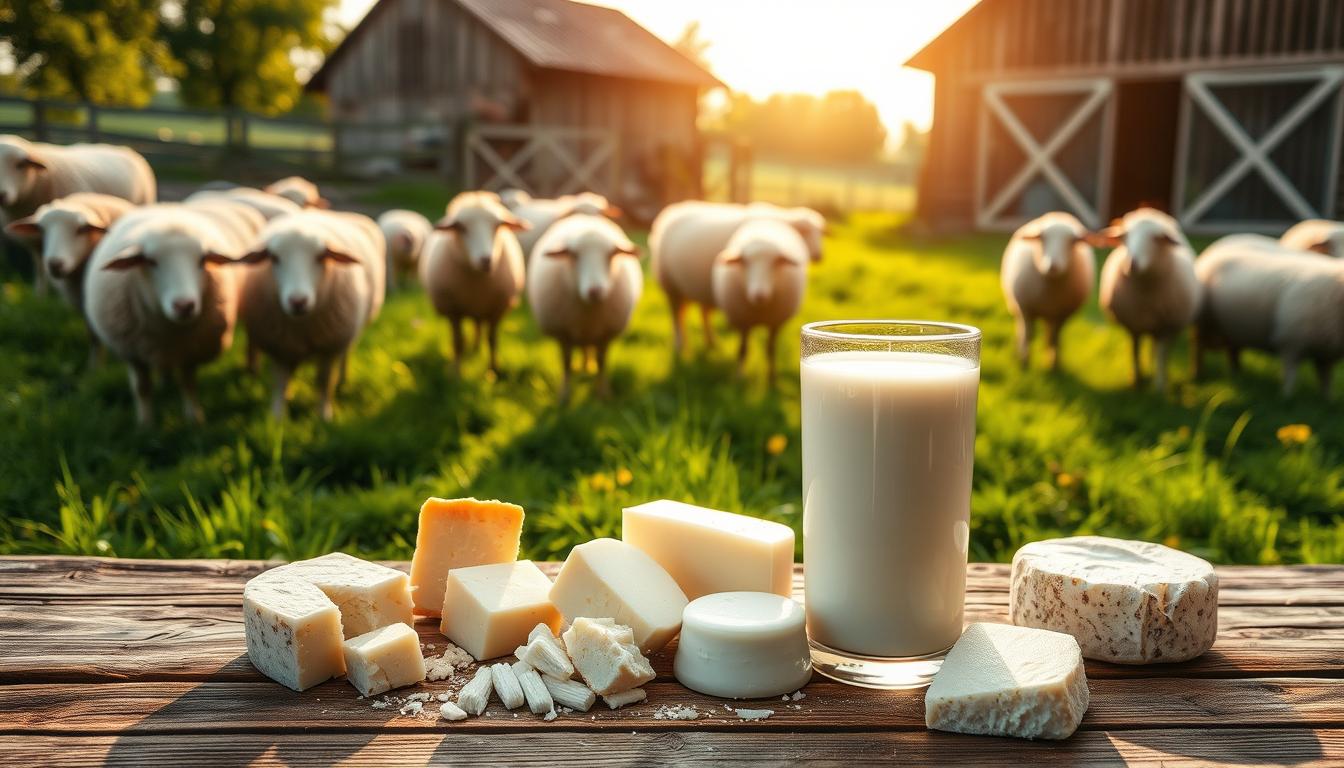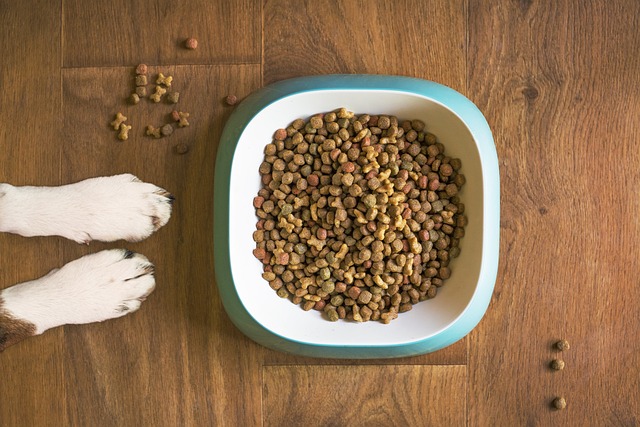Enjoy Sheep Milk Even If You’re Lactose Intolerant: A Complete Guide

Sheep milk is often a good choice for those allergic to cow milk, with over 90% of milk allergy patients also allergic to goat milk1. But, if you’re lactose intolerant, sheep milk might not be the best option1. It has less lactose than cow milk but is still a high lactose food1. For those looking for a better option, sheep milk contains A2 beta-casein, which is easier to digest than cow’s milk2.
Whether lactose intolerant people can have sheep milk is not a simple yes or no1. It depends on how sensitive they are to lactose1. For those looking for a dairy alternative, sheep milk might be a good choice1. It’s important to talk to a doctor before trying it, especially if you’re on a dairy-free diet for health reasons1. Sheep milk has unique benefits, like being naturally homogenized and having more medium/short-chain fatty acids, which can help with lactose absorption2.
Key Takeaways
- Sheep milk may be a good alternative for those sensitive to cow milk, but not for those with lactose intolerance1.
- Sheep milk contains A2 beta-casein, a more easily digestible form compared to cow’s milk2.
- Sheep milk is lower in lactose than cow milk but is still considered a high lactose food1.
- Sheep milk is naturally homogenized and contains higher quantities of medium/short-chain saturated fatty acids2.
- It’s essential to discuss sheep milk with a physician if following a dairy-free diet due to health conditions or disease prevention1.
- Sheep milk is significantly higher in milk solids and contains double the fat of cow or goat milk, making it perfect for cheese and yogurt production3.
- Sheep milk is high in A2 protein, Vitamin B12, and folate, making it a nutritious option3.
Understanding Sheep Milk’s Unique Properties
Sheep milk is a nutritious choice for those who can’t digest cow’s milk well. It’s packed with calcium, protein, and fat, making it easy to digest4. It also has more conjugated linoleic acid, magnesium, zinc, and B vitamins than cow’s milk5.
Some key benefits of sheep milk include:
- Higher nutritional value compared to cow’s milk
- Rich in phospholipids, making it one of the richest sources among various types of milk4
- Abundant in medium-chain fatty acids (MCFAs) that positively impact gut microbiome diversity4
Sheep milk is easy to digest for those who can’t handle lactose. It has oligosaccharides, which boost the immune system and improve gut health4. It also has immunoglobulins and lactoferrin to fight off bad bacteria and keep the gut healthy4.
Sheep milk is a great option for those who can’t digest cow’s milk. It’s full of nutrients and is easy to digest. Knowing what’s in sheep milk helps you decide if it’s right for you5.
| Nutrient | Cow’s Milk | Sheep’s Milk |
|---|---|---|
| Calcium | 120mg/100g | 170mg/100g5 |
| Protein | 3.2g/100g | 5.5g/100g4 |
Can Lactose Intolerant People Have Sheep Milk?
When thinking about a lactose intolerant diet with sheep milk, it’s key to know the differences. Sheep milk and cow’s milk have different proteins and less lactose6. Studies show lactose intolerance is rare in places where dairy is common, like Ireland7.
A lactose intolerant diet with sheep milk could be a good choice. Sheep milk is easier to digest because of its fatty acids and protein structure6. It also has a unique mix of lipids that can help with digestion6. You can find sheep milk products, like yogurt, at Velvet Cloud or learn more about Pete’s Market Milk.
Some benefits of sheep milk for those with lactose intolerance include:
- Less lactose than cow’s milk
- A different protein that’s easier to digest
- Naturally homogenized, which can help avoid digestive problems
In summary, a lactose intolerant diet with sheep milk is a good option. Its unique qualities and health benefits make it worth trying8.
The Science Behind Sheep Milk Digestion
Sheep milk is easier for lactose intolerant people to digest. It has a different lactose content than cow milk, which can cause stomach issues9. Some people might be sensitive to A1 beta-casein protein in cow milk, making sheep milk a better choice9.
Sheep milk’s protein structure is beneficial for digestion. It contains A2 protein, which doesn’t cause stomach problems like A1 protein does9. It also has more calcium, zinc, protein, fat, vitamins, and minerals than cow milk10. The fat molecules in sheep milk are unique, with medium-chain fatty acids and CLA10.
Lactose Content Differences
Sheep milk has less lactose than cow milk, making it better for those with lactose intolerance. It has more short-chain fatty acids, which are easier to digest10.
Protein Structure Benefits
Sheep milk’s protein is easier to digest than cow milk. It has more BCAAs, like leucine, valine, and isoleucine10. This makes it a good choice for those seeking a digestible protein source.
The science behind sheep milk digestion reveals its unique benefits. It has less lactose, a more digestible protein, and more nutrients than cow milk910. This makes sheep milk a great option for those seeking a dairy alternative that’s easy to digest910.
Benefits of Sheep Milk for Digestive Health
Sheep milk is great for those who can’t handle cow milk. It helps with managing lactose intolerance with sheep milk. This is because sheep milk is easier to digest, which means less chance of getting sick from it. Studies show it has more lactoferrin and proteins that fight off bacteria and reduce inflammation11.
The benefits of sheep milk for lactose intolerance are many. It can help ease symptoms and boost your digestive health. Some main advantages include:
- More nutrients like calcium, fat, iron, and vitamins A and C
- Less cholesterol and lactose than cow milk
- It has anti-inflammatory effects and improves blood flow
Sheep milk is also packed with proline, a key amino acid for healing and fixing joints12. It also has substances like CLA and Orotic Acid. These might help prevent diseases like type 2 diabetes, Alzheimer’s, and cancer12. So, sheep milk is a top pick for those wanting to manage lactose intolerance with sheep milk and better their digestive health.
Comparing Sheep Milk to Other Dairy Alternatives
For those who can’t digest cow’s milk, sheep milk is a good choice. It has more protein, calcium, and vitamins than cow’s milk13. Its fat globules are also smaller, making it easier to digest for some14.
Sheep milk tastes richer and creamier than goat’s milk, and it’s more nutritious14. But goat’s milk has more zinc and selenium. Soy milk is a plant-based option, but it doesn’t match sheep milk in taste or nutrition15.
A study showed that sheep milk might be better for those who can’t digest cow’s milk. It found that sheep milk could be a good choice for those with lactose intolerance who have trouble with cow’s milk sheep milk digestion for lactose intolerant13.
| Milk Type | Protein Content | Calcium Content |
|---|---|---|
| Cow’s Milk | 8g per cup | 25% DV per cup |
| Sheep’s Milk | 15g per cup | 47% DV per cup |
| Goat’s Milk | 8g per cup | 25% DV per cup |
In conclusion, sheep milk is a nutritious and viable alternative to cow’s milk for lactose intolerant individuals. It offers a unique mix of nutritional value and digestibility15.
How to Introduce Sheep Milk Into Your Diet

Starting with small amounts of sheep milk is key if you’re lactose intolerant. Everyone’s body reacts differently, so watch how you feel. Try replacing a bit of your daily dairy with sheep milk products like cheese or yogurt to see how you do16.
Sheep milk is packed with protein and has less fat than cow’s milk16. Its protein and fat are structured differently, making it easier to digest for some16. Also, aged sheep milk cheese has less lactose because of the aging process16.
Adding sheep milk to your diet can be good for you. It’s full of vitamins A, E, and antioxidants, plus conjugated linolenic acids (CLA)17. It’s also a great source of protein, helping with muscle growth and repair17. Plus, it has lots of calcium, important for strong bones17.
Choose high-quality sheep milk products from trusted sources. Opt for pasteurized milk from local farmers, suitable for all ages17. By doing this and watching how your body reacts, you can enjoy sheep milk’s health benefits safely18.
Finding and Storing Quality Sheep Milk Products
Finding and storing quality sheep milk products is key when managing lactose intolerance. Sheep milk has less lactose than cow’s milk, making it easier to digest for those with lactose intolerance19. It also has more fat than cow’s milk20.
To pick the best sheep milk products, consider these factors:
- Look for products labeled as organic, pasture-raised, and grass-fed20
- Check the protein and calcium content, as sheep milk has more protein and calcium than cow’s milk19
- Choose products with higher levels of certain minerals, such as zinc and selenium20
Proper storage of sheep milk products is also crucial. Store them in a cool, dry place, and follow the recommended expiration dates19. By choosing and storing quality sheep milk products, you can enjoy their benefits while managing lactose intolerance.
Cooking and Baking with Sheep Milk

Sheep milk is great for many recipes, especially for those with lactose intolerance. It’s a good choice because it’s creamy and has a mild taste. You can find more about a balanced diet here.
Sheep milk is high in fat, making it perfect for creamy sauces and moist baked goods21. It also has lots of nutrients like protein, calcium, and vitamin B1221. But, remember, it has more lactose than cow’s milk, about 4.2 to 5.4 grams per 100 grams22.
Recipe Modifications
To use sheep milk well, you need to adjust recipes. For cheese or yogurt, you might need to change the cultures or enzymes22. It’s also great for making desserts like cheesecakes or creme brulee, which are good for those with lactose intolerance.
Best Culinary Applications
Sheep milk is great for sauces, soups, and baked goods. Its creamy texture and mild taste are perfect for many dishes21. You can also make cheese, yogurt, and butter from it, which are good for those who can’t have cow’s milk14.
Common Myths About Sheep Milk and Lactose Intolerance
Many people think sheep milk is easier to digest than other milks for those who can’t handle lactose. But, this isn’t true. All milks from cows, goats, and sheep have about the same amount of lactose, around 12 grams per cup23.
Some believe lactose intolerance is rare. But, it’s actually common in people from African, Asian, Hispanic, or Native American backgrounds23. It happens when people can’t make enough lactase enzyme to digest lactose23.
It’s important to know the facts about sheep milk and lactose intolerance. Sheep milk has more protein than cow milk and breast milk. But, it’s not good for everyone24. With the right info, people can choose the best dairy for them and enjoy sheep milk if they can tolerate it.
| Milk Type | Lactose Content | Protein Content |
|---|---|---|
| Cow’s Milk | 12 grams per cup | 3-4% |
| Sheep’s Milk | 12 grams per cup | 6% |
| Breast Milk | Varies | 1% |
Potential Side Effects and Considerations
When managing lactose intolerance with sheep milk, it’s key to think about possible side effects. Some people might feel bloated or gassy because of sheep milk’s special properties25. But, research shows that A2 protein in sheep’s milk might ease digestive problems for those who are sensitive to A1 protein25.
The benefits of sheep milk for lactose intolerance are many, but it’s vital to watch how your body reacts. You might need to:
- Start with small portions to test your tolerance
- Keep an eye on your digestive health and adjust your intake as needed
- Get advice from a healthcare professional or registered dietitian
Also, sheep milk has more essential amino acids and can help with high cholesterol26. Some folks might have to avoid all lactose foods and drinks, while others can just cut back27.
In summary, while there are possible side effects, the good points of sheep milk for lactose intolerance make it worth trying. By paying attention to how you feel and tweaking your diet, you can enjoy sheep milk’s health benefits while avoiding bad reactions25.
| Milk Type | Lactose Content | Protein Type |
|---|---|---|
| Cow’s Milk | High | A1 and A2 |
| Sheep’s Milk | Lower | A2 |
| Goat’s Milk | Lower | A2 |
Conclusion: Making Sheep Milk Work for Your Lactose Intolerant Lifestyle
As you’ve learned, sheep milk cheese can be a great choice for those with lactose intolerance or looking for a healthier dairy option28. It has more vitamins, minerals, and fats good for the heart, and less lactose. This makes it perfect for your diet.
Research29 shows most people with cow’s milk allergies or sensitivities can eat sheep milk products without issues29. In fact, over 80% of study participants chose sheep milk as their milk substitute. This shows it’s well-liked by those with lactose intolerance.
So, why not try sheep milk cheese? Add it to your meals, try new recipes, and see how you feel28. With its great taste and health benefits, sheep milk can change how you manage lactose intolerance. It offers a tasty and healthy dairy option2829.
FAQ
Can lactose intolerant people have sheep milk?
What are the benefits of sheep milk for lactose intolerant individuals?
How does the digestion of sheep milk compare to cow’s milk for lactose intolerant people?
What are the potential side effects or considerations when consuming sheep milk for lactose intolerant individuals?
How can lactose intolerant individuals incorporate sheep milk into their diet?
How does sheep milk compare to other dairy alternatives for lactose intolerant people?
Source Links
- https://godairyfree.org/ask-alisa/ask-alisa-does-goat-milk-and-cheese-qualify-as-dairy-what-about-sheep-milk-products – Are Goat Milk and Cheese Dairy? What about Sheep Milk?
- https://velvetcloud.ie/blogs/news/the-questions-people-have-been-asking-about-sheep-s-milk-online?srsltid=AfmBOoopnLUwqp9SxIHKN7mDq5hhYW56dN-g662ONHAoEiemIkI-sPwR – The Questions People Have Been Asking About Sheep’s Milk Online
- https://medium.com/@susan_holtham/goat-and-sheep-milk-vs-cows-milk-what-s-the-difference-and-benefits-88db61ccb9e0 – Goat and sheep milk vs. cow’s milk: what’s the difference and benefits?
- https://jonesfamilyfarm.co.nz/sheep-milk-benefits-gut-health-dairy-intolerance/ – Sheep Milk Benefits for Gut Health and Dairy Intolerances
- https://pmc.ncbi.nlm.nih.gov/articles/PMC9686720/ – Lactose Content and Selected Quality Parameters of Sheep Milk Fermented Beverages during Storage
- https://velvetcloud.ie/blogs/news/the-questions-people-have-been-asking-about-sheep-s-milk-online?srsltid=AfmBOooIi1hcuoNhDDgvYQn9R0w8QDdoLe3g0lHU-c72AoUglOn9qWS2 – The Questions People Have Been Asking About Sheep’s Milk Online
- https://velvetcloud.ie/blogs/news/does-sheeps-milk-have-lactose?srsltid=AfmBOoqonHd5RIAkP3Sh0jF5DuS47-f6C_hE09s1iwjaelQ3Zf1RYvym – Does Sheep’s Milk Have Lactose?
- https://boards.straightdope.com/t/sheeps-milk-lactose-free/172231 – Sheep’s milk, Lactose free?
- https://velvetcloud.ie/blogs/news/does-sheeps-milk-have-lactose?srsltid=AfmBOooNiIOGqZPc17MQUUmPkdaUPFhp-B3avDxZvPEC2Zmil3oCfcoC – Does Sheep’s Milk Have Lactose?
- https://www.auckland.ac.nz/en/news/2019/12/18/sheep-milk-more-easily-digested-than-cow-milk-.html – Sheep milk more easily digested than cow milk
- https://pmc.ncbi.nlm.nih.gov/articles/PMC8122369/ – Importance of Bioactive Substances in Sheep’s Milk in Human Health
- https://jonesfamilyfarm.co.nz/benefits-of-sheep-milk/ – Benefits of Sheep Milk – Jones Family Farm
- https://thecoconutmama.com/sheep-milk-vs-milk/ – Sheep Milk vs Milk: The Ultimate Verdict
- https://www.joyoushealth.com/26725-blog-cow-vs-goat-and-sheep-s-milk-which-is-better – A lot of my recipes are dairy-free, and I often encourage my clients to cut out dairy, at least for a litt …
- https://casadesante.com/blogs/milk-alternatives/soy-milk-vs-sheep-milk?srsltid=AfmBOoplYKYm3iIpQYVqbX0MSJ-bqTmETgGmnySaC8R_aspLwM5qUv39 – Soy Milk vs Sheep Milk
- https://vermontshepherd.com/pages/health-nutrition-environment – Health, Nutrition, Environment
- https://www.lepetitbasque.fr/en/try-sheeps-milk-2/ – Osez le lait de brebis – Le Petit Basque
- https://grandvewe.com.au/faqs-about-sheep-cheese/ – FAQs — Grandvewe
- https://fernglenfarm.co.nz/best-cows-milk-alternative/ – What is the Best ‘Milk’ Alternative – Fernglen Farm
- https://casadesante.com/blogs/milk-alternatives/sheep-milk-vs-sheep-milk?srsltid=AfmBOorMNv38K-fM-kfaZPVp9xBPnGTUTtVaQK-XZWVqfVwbKzNw3BvI – Sheep Milk vs Sheep Milk
- https://casadesante.com/blogs/milk-alternatives/sheep-milk-vs-pea-milk?srsltid=AfmBOoo5A8kqT9TSr_S0z9OxZ-efygZ7er0C9XWlhX4s_i60c1zhJqto – Sheep Milk vs Pea Milk
- https://www.arlafoods.co.uk/brands/lactofree/all-articles/is-sheeps-milk-lactose-free/ – Is Sheep’s Milk Lactose-Free
- https://www.janetfletcher.com/blog/2014/12/7/got-lactose – got lactose? — Janet Fletcher
- https://www.abbeyskitchen.com/goat-milk-vs-cow-milk-vs-sheep-milk-for-babies-does-dairy-cause-colic-allergies-disease/ – Goat Milk vs Cow Milk vs Sheep Milk for Babies
- https://velvetcloud.ie/blogs/news/does-sheeps-milk-have-lactose?srsltid=AfmBOoq515F_gjubB3yA6vYivyogIKDLGwVFslwmBiLDJ8o4d04Yj35D – Does Sheep’s Milk Have Lactose?
- https://www.mygenefood.com/blog/dairy-dangers-sheep-goat-dairy-healthier-cow-dairy/ – Cow Casein vs. Goat and Sheep Dairy: Which is Healthier? – Gene Food
- https://www.medicalnewstoday.com/articles/is-lactose-intolerance-an-allergy – Lactose intolerance vs. dairy allergy
- https://www.shepherdspurse.co.uk/blogs/news/experience-the-health-benefits-of-artisan-sheep-milk-cheese-a-nutritious-and-delicious-alternative?srsltid=AfmBOooZv5HYQmXwxcMDzOJfJOobO0fIASNjaLwh8ZXGJDIg-XxLafH9 – Experience the Health Benefits Sheep Milk Cheese: A Nutritious and Del
- https://sheepdairy.wordpress.com/tag/sheep-milk/ – sheep milk – sheepdairy



